ISRO Made every Indian proud after all its successful mission. now, it is time for India to be proud of the Private sector space industry expanding toward the future.
Team Indus, an Indian aerospace startup and the only Indian team in the Google Lunar X PRIZE competition is building a privately funded Spacecraft capable of landing on the Moon in 2017.
The Google Lunar XPRIZE Competition of $30 million Winning Prize, Awarded to the First Team that successfully landed a rover on the moon's surface, Traveled 500 meters on the Moon, and transmitted HD Video and Images to Earth.
Team Indus is a First Mover in the private sector Space Industry of India giving such a spirit of innovation and adventure in science and technology in India.
A team of hundred making a dream of a nation
The Team Indus Rover name ECA (Ek Choti si ASHA) created Millions of new wishes (Asha) in every Indian, every child for encouragement for science.
About The X Prize Foundation
XPRIZE Foundation is Non for Profit organization, that mainly focuses on Public Competitions to encourage technological development that could benefit mankind. XPRIZE Foundation was founded in 1996 located in California, USA. Indian Ratan Tata is one of the trustees of the Organization.
Read More: About XPRIZE Foundation and India
AboutGoogle Lunar X PRIZE
So basically Google Lunar X PRIZE Competition is Organized By The X PRIZE Foundation and sponsored by Google Inc.
The $30M Google Lunar XPRIZE is an unprecedented competition to challenge and inspire engineers, entrepreneurs, and innovators from around the world to develop low-cost methods of robotic space exploration.
Read More:About the Google Lunar Xprize
About Team Indus
Team Indus is an Active competitor in the Google Lunar X Prize, a for-profit organization headquartered in Bangalore India, founded in 2011.
Team Indus is the only Indian team in the Google Lunar X PRIZE competition, is building a privately funded Spacecraft capable of soft landing on the Moon by 2017.
TeamIndus is one of five teams remaining in the competition and has secured verified launch contracts for 2017 to land a robot on the surface of the Moon, travel 500 meters over the lunar surface, and send images and data back to the Earth.
Team Indus has already won a $1 million "milestone" prize for developing its landing technology. It is now one of only five teams that signed confirmed launch contracts before a December 31, 2016 deadline.
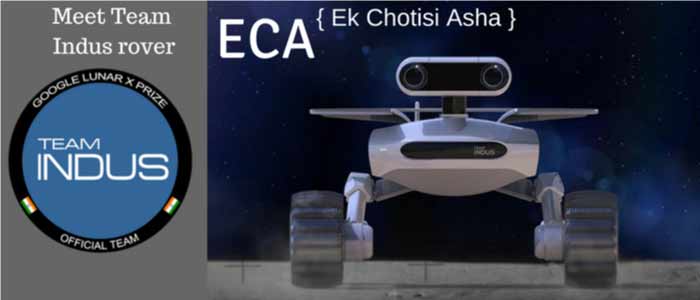
About Organization
A team of more than 100 techies--young engineers guided by a group of retired senior scientists from the Indian Space Research Organization (ISRO).
A team of nearly 85 engineers and 15 retired ISRO scientists based out of Bengaluru, Team Indus.
The Bangalore-based aerospace engineers under the startup Axiom Research Labs is the only Indian team in the final five competing to be the first privately-funded entity to moonshot as it readies itself for a monumental space mission later this year.
Website: www.teamindus.in
Cost and Budget of Team Indus Mission
Budget: $70 -$75 Million (From Privat Partner and Investor)
the total sum required is US$70 million and currently, they’re in the process of raising another round of US$10 million.
The TeamIndus spacecraft (or lander) has tanks that will cost $2.5 million, a $3 million engine, and an IMU (inertial measurement unit) to maneuver the spacecraft which costs $1.5 million. The vibration test of the spacecraft at ISRO (over Rs50 lakh) costs more than that version of the spacecraft.
Every Indian who contributes as little as 500 rupees ($7.25) will get his or her name etched on an aluminum cube that will ride to the moon on board the spacecraft.
Key People of Team Indus
Rahul Narayan is the Co-founder/Team Leader of Team Indus Team members are Rahul Narayan, Dilip Chabria, Sheelika Ravishankar, and Nirmal Suraj.
Key People of Team Indus

Key People of Team Ind
| Name | Position in Team Indus | Former | Join From |
| Rahul Narayan | Founder/ Team Leader | IIT grad and serial software entrepreneur | Early 2011 |
| Indranil Chakraborty | Co-founder and aviation specialist | An aerospace engineer | 2011 |
| Sameer Joshi | Team Indus Jedi Master (Special Projects) | A former Indian Air Force fighter pilot | Join in 2013 |
| Dilip Chabria | Co-Founder and Jedi master (Business Development) | His career as an advertising professional | Associate since 2011 and supported from outside till 2012 |
| Julius Amrit | Co-Founder and Jedi Master (Investment) | Career as an investment banker | Associate since 2011 and supported from outside till 2012 |
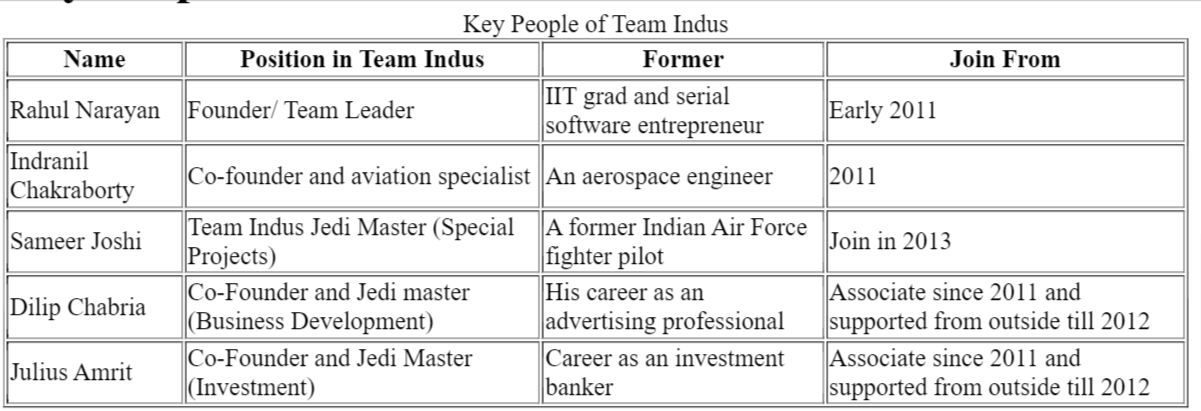
Mission to Moon: Team Indus Rover ECA
Launch: December 28, 2017 aboard PSLV rocket from ISRO (Indian Space Agency)
Vehicle: HHK-1 Lander, 11-lb, Solar power ECA Rover
ECA stands for "Ek Choti si Asha" The Hindi phrase "एक छोटीसी आशा" may mean "a small Wish".
Team Indus's 8-kg, four-wheeled lunar rover. TeamIndus will also manage to land a small payload (the size of a can—about 250g) as part of its Lab2Moon project
The spacecraft will carry a 20-kg payload of which 10 kg will be allotted for commercial use and will be shot into lunar orbit atop a Polar Satellite Launch Vehicle
Team Indus is working on the fifth generation of its rover, Which the final Version will travel to the moon and it is expected that by July 2017, it will have the fifth prototype of its lander ready.
The Journey of Team Indus
Their biggest challenge is that they have never built a Spacecraft before and as such have to learn everything while they are doing here from scratch. For a team that had absolutely no background in aerospace when they started.
Given that they have to also focus on speed while keeping costs low, they constantly monitor and ensure that this project is built using lean and frugal engineering methods.
"The first year went by on trying to figure out where to start, There were questions like—what’s the budget; who is going to help you build this; what do you build; and how do you build it? Do you build something small and efficient? Or do you build something large and very bombastic" Narayan recalls.
2010 Team Indus participated in the Google Lunar XPrize
The last day of the competition was 31 December 2010, and there wasn’t a single Indian team. Rahul Narayan and His Team Researched as much they could as they could and ended up registering on the very last day, December 31st, 2010.
"A bunch of folks with absolutely no background in aerospace got into this program to see how it plays out. It wasn’t a hollow bet, though, because we had to pay an upfront sum of $50,000 to register"- Rahul Narayan on how TeamIndus participated in the Google Lunar XPrize challenge.
2012 Mission Concept
TeamIndus made presentations to Isro around the end of 2012 and beginning of 2013, and "we were completely blown away with how receptive they were about our ideas", Narayan recalls.
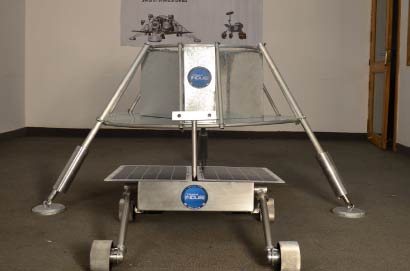
Credit: Team Indus
Build - 0.8 Versions Complete
has completed building the terrestrial version of our rover "ECA 0.8" and lander "HHK 0.8" to end Q4 2012 on a high.
2013 System Design
- The team Indus began getting some ISRO Scientists as advisers.
- Team Indus Shifted Headquarters from New Delhi to Bengaluru in early 2013.
- Team Indus is Ready for Procurement review Evolution.
2014
- The Team Indus signed up a set of partners like Larsen and Toubro Ltd, Tata Communications Ltd, and Sasken Communication Technologies Ltd, to provide us with services, infrastructure, introduction with people, and other things
- Shortlisted as top among 18 global teams
- Advanced launch discussions with Antrix
- 30-person design team
- Near 50% development completion
2015 Team Indus Winning $1 M Terrestrial Milestone Prize
The Team Indus completed the PROTOTYPING Model.
The Milestone Prizes were awarded in three categories – imaging, mobility, and lander systems – out of which Team Indus was competing for prizes in imaging and lander systems.
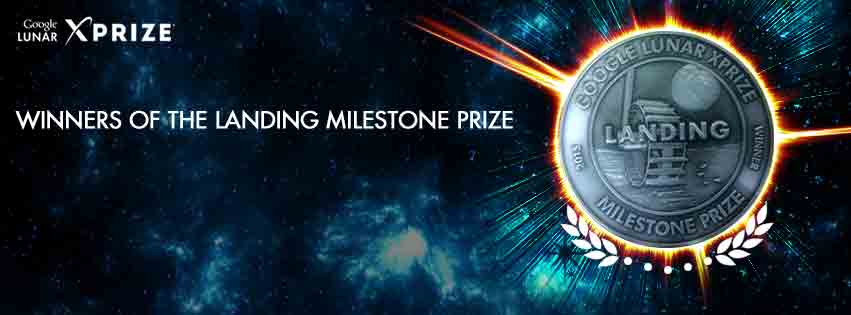
in Jan 2015, Team Indus won the Google Lunar XPrize Landing Milestone prize called the Terrestrial Milestone Prize of $1 Million for their development of lander systems.
2016 PROTOFLIGHT SPACECRAFT READY
December 2016
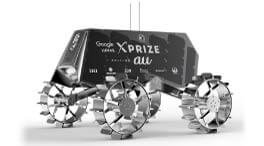
Apart from ECA, TeamIndus has announced that it will carry a robotic rover developed called HAKUTO. The Japanese team is Hakuto's rover on board our Spacecraft to the Moon. the Japanese team in the Google Lunar XPR
the Japanese team Hakuto's rover on board our Spacecraft to the Moon in the Google Lunar XPR.
2017 Team Indus is Ready for Moon Exploration
January 2017
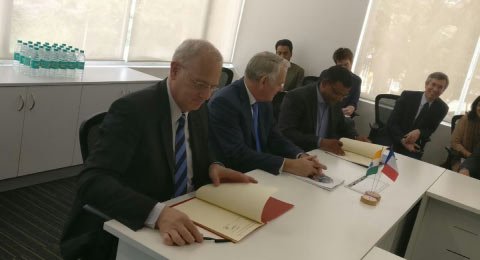
Image credit: thetechportal.com
The Contract with France’s national space agency CNES will provide camera systems to ride along on the rover to TeamIndus.
France is the global leader in the micro-camera technology that will equip sensors designed to aid TeamIndus' rover's progress by detecting ground obstacles in its path.
France’s cameras will help the Indian rover navigate the surface, looking out for rocks and other obstacles as the robot attempts to move 500m to win the $20 million Google Lunar XPRIZE grand prize.
Team Indus Contract with ISRO

Team Indus is building a spacecraft to soft-land a rover on the moon by the end of this year and fly the Indian flag up there on the country's Republic Day (January 26, 2018).
TeamIndus is using a PSLV for the mission. It will launch the Spacecraft to Low-Earth Orbit after which Team Indus takes control and manoeuver it till touch-down. Team Indus signed a launch contract with ISRO last year and has set the date of 28 Dec 2017 for launch.
The Craft carrying Tiranga, The Indian Nation Flage Would be hoisted on 26 January 2017 on the occasion of Indian Republic Day.
The spacecraft will be carrying the rover Hakuto of its Japanese co-contestant.
make a soft landing on January 26, 2018, i.e Next year Republic Day, Team Indus' spacecraft will land on the Moon
If they succeed in operating and performing predefined tests for 14 days, they will claim a Google Lunar X Prize worth $30 million.
Power India to The Moon
there's no doubt that ISRO has achieved a lot over the years. India has developed and explored space missions at low cost and higher quality. we already see that ISRO was not deterred by the fact that the $57 million Chandrayaan 1 lasted for 312 days despite a target of two years.
The Mars mission cost just $74 million. In May 2016 ISRO successfully launched a scale model of a reusable space shuttle; that project cost $15 million.
The Team Indus mission will be a powerful boost for robotic technology in India, which must move quickly up the value chain if it wants to create millions of jobs for its young population over the next decades.
What do you think about Team Indus? comment Bindasly...
